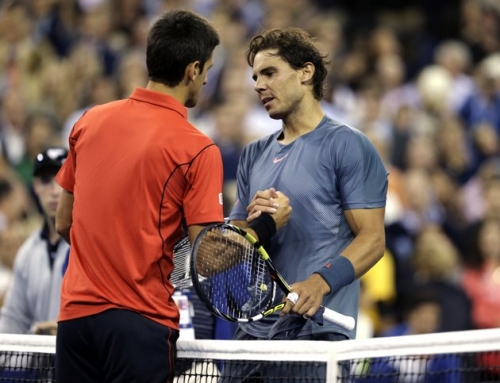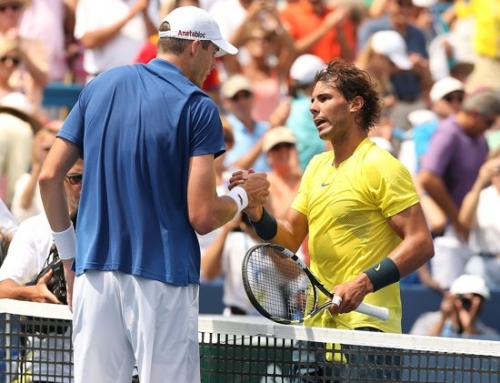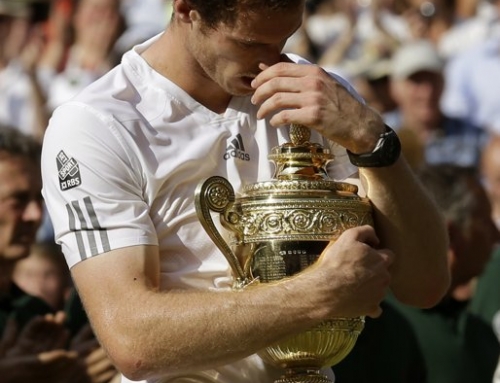When all is said and done, it’s not clear just how long Federer will maintain the crown “greatest of all time”, but he’s about to reach a milestone that he’s not looking forward to.
Federer’s credentials for GOAT (greatest of all times) lies primarily with his 16 Slam wins. Of course, there’s more to it than that. He’s the only player to win 3 Slams in the same year three times in the pro era. Nadal has done it once, Djokovic has done it once, Wilander has done it once. Federer? Three times.
Federer is one week short of tying Sampras’s weeks at number one. Alas, this record is looking hard to break. Federer would have done it had he not had some sketchy periods (such as losing to Montanes at Estoril one year) in his career.
With the conclusion of the US Open, Federer’s record of winning a Slam every year has stopped. The last time he didn’t win a Slam was in 2002.
Another record is about to fall.
You have to go back to 2003 when Federer won Wimbledon to find the last time Federer was ranked lower than 3. Prior to Wimbledon 2003, Federer was ranked 5 and seeded 4. He beat Mark Phillippousis to win his first Slam title and his rank was 3 afterwards. Since then, Federer’s rank has never dropped below 3.
And this takes into account that Murray has actually been number 2 in the world. This happened when Nadal was recovering from his knee issues and had to skip Wimbledon. That combined with an early loss in the French meant Nadal’s ranking slipped. Djokovic was also not playing that well then. So Federer, off the strength of his French-Wimbledon double, was number 1 while Murray, for a brief period of time, was number 2.
While Federer and Djokovic both took time off to recover from injuries, Murray sensed a huge opportunity. He was already ahead of Federer in year-to-date points, that is, from points gathered since January 1. Players’ ranks are based on the last 12 months and Federer won a ton of points starting at Shanghai of last year (winning Stockholm, Basel, and London, reaching the finals of Shanghai, and the semis of Paris). He’s already given up his finalist point in Shanghai and will give up his Stockholm points. Murray knew that Federer would have a hard time staying at 3 if Murray played the Asian swing well.
And that Murray has done. Murray won Bangkok, won Tokyo, and won Shanghai. He picked up 1750 points from this three week period, and that’s huge. Murray trailed Federer by less than 600 points before Shanghai. With Murray being the defending champ, his point total remained unchanged after Murray defended. But Federer was a finalist at Shanghai, so he lost 600 points by not playing. That puts Murray at 7825 points to Federer’s 7780 points.
That means when Murray becomes number 3 on Monday, October 17, Roger Federer will be at his lowest rank since 2003, just before he won his first Slam.
But here’s the kicker. There’s pretty much no way that Federer can end the year at number 3.
Let’s look at the year-to-date points. These are the points the top players have earned since January (rankings are based on the past 12 months with year-end rankings based since January), you’ll see, as of Monday,
- Novak Djokovic (13, 295)
- Rafael Nadal (9,500)
- Andy Murray (7,200)
- Roger Federer (5,185)
Pay attention to the lead between Murray and Federer. He leads by 2015 points. For Federer to end at number 3, he needs to pick up 2020 points before the end of the year.
Now, let’s look at Federer’s schedule for the rest of the year. He plans to only play 3 more tournaments: Basel, Paris, and London. If he maxes out all three, he’ll pick up 500 points for Basel, 1000 points for Paris, and 1500 points for London. That total is 3000 points. Right now, he trails Murray by more than 2000 points.
Murray would need 1000 points to ensure he is number 3 at the end of the year. But frankly speaking, Federer would have to play amazing. If Murray defends his points (90 points from Paris and 400 points from London), he’ll have 500 points. His chances of doing this are pretty good. 90 points is a quarterfinal result at Paris which plays perhaps a touch faster than Shanghai. 400 points at London is two wins in the round robin. Murray is likely to get two wins and only has to deal with one of Djokovic and Nadal in round robin play. He won’t face Federer because he and Murray should be third and fourth seed, and those two go in opposite round robin teams.
Federer has almost no room to slip up. The hardest part for Federer will be defending his year-end championship. If he doesn’t go undefeated, he’ll drop 200 points at least. If he loses in the final, he’ll drop 500 points. If he doesn’t get past the semifinals, he’ll drop at least 900 points.
Federer basically can’t slip up anywhere. If he merely defends his points (which is a tall order), he’ll have 500 + 360 + 1500 = 2360 pts and he would still retain number 3 if Murray didn’t play. Murray would simply need about 350 points in two more tournaments to get to 3. Realize that Djokovic is planning to play Basel and beat Federer two years ago.
If Federer doesn’t do exceptionally well, then he’ll slip to number 4 in the world.
And when’s the last year Federer finished worse than 3 in the world? That would be 2002 when he finished 6th in the world.
Of the top 4 players, Federer and Djokovic are taking a huge amount of time off, approximately five weeks. Neither player is expected to return until Basel. Players have a rest period between the year-end championship and the first tournament in January. It’s about 5 weeks as well. Indeed, many players use the time after the Australian Open to rest and recover as well. The question is how both players will play once they come back. Federer has a huge task ahead of him. You can see obvious improvements in Djokovic’s game. Murray has worked hard to add more power elements to his game. But Federer tends to look the same.
Over the past 3-4 years, Federer has tried to solidify his serve, but he’s added no pace to it. His backhand is better, but not threatening. He’s hitting his drop shots better. Where Federer really needs to get better is return of serve. You only have to look at the last 4 Wimbledons to see that the return has hurt Federer a lot. While Nadal, Djokovic, and Murray are known for their return, Federer is not.
Let’s start with 2008 Wimbledon. Federer had break opportunities early in the first two sets against Nadal. But he stopped getting break points and needed to hold his serve and use two tiebreaks to get to a fifth set. In 2009, Federer only broke Roddick’s serve once in 5 very long sets. Again, Federer needed 2 tiebreaks to win the sets he did. In 2010, Federer only broke Berdych once although he did have opportunities to break. In 2011, Federer broke Tsonga just once early in the first set.
And you know what? In five sets, that break point was the only break point Federer had. Only one.
The return is hurting Federer a lot. Federer’s focus and serve allows him to break most players just often enough. So hopefully, he’ll try to address this, but the return seems notoriously tough to improve because it means improving reaction time.
When Federer comes back to tour, he’ll be asked, much like Roddick, questions about retirement. Already, he sees threats to some of his records. This is the first year since 2002 that Federer hasn’t won a Slam. Federer is still one week short of tying Sampras’s record for weeks at number 1, and that is looking more and more distant. Federer, oddly enough, has Djokovic to thank for Nadal not adding much more to his Slam count. Had Nadal figured out Djokovic in the Slams, he would be at 12 Slams, just 4 short of Federer. Of course, he has Djokovic to blame for not reaching the US Open final for the second year in a row.
And now, 8 years after he first became number 3 in the world, Roger Federer is going to see how it feels to be number 4 in the world and end the year ranked lower than 3 (more than likely) for the first time since 2002 when he finished the year at number 6. It’s been a nice run for Federer, but it’s ending.
And that’s a bitter pill to swallow.




![[US Open Men’s Final] Can Djokovic beat Nadal in the finals?](https://www.essentialtennis.com/wp-content/uploads/2013/09/20130909djokovic-500x383.jpg)


![[French Open] The tactics of the Djokovic-Nadal semifinals](https://www.essentialtennis.com/wp-content/uploads/2013/06/20130607nole-500x383.jpg)